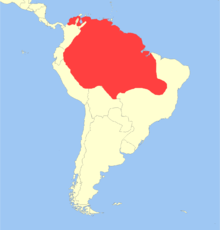Amazonian brown brocket
| Amazonian brown brocket | |
|---|---|
| Scientific classification | |
| Kingdom: | Animalia |
| Phylum: | Chordata |
| Class: | Mammalia |
| Order: | Artiodactyla |
| Family: | Cervidae |
| Subfamily: | Capreolinae |
| Genus: | Mazama |
| Species: | M. nemorivaga |
| Binomial name | |
|
Mazama nemorivaga (F. Cuvier, 1817) |
|
 |
|
The Amazonian brown brocket (Mazama nemorivaga), also known as the small brown brocket, is a small species of deer that is almost entirely restricted to South America. It is known from Panama (in Isla San José of the Pearl Islands only; endemic subspecies M. n. permira), Colombia, Venezuela, Guyana, Suriname, French Guiana, eastern Ecuador, eastern Peru, Brazil and possibly northern Bolivia. Habitats it is found in include primarily nonflooded Amazonian tropical rainforest, and locally also tropical deciduous forest and xeric shrublands, at altitudes up to 1,500 metres (4,900 ft). However, reports from the latter habitats may actually represent M. gouazoubira.
Breeding occurs year-round in some areas, with births tending to be concentrated in the rainy season. It is threatened by deforestation and by diseases spread by cattle, but not particularly by hunting.
It is sympatric with the larger M. americana over much of its range (the latter tends to have significantly higher population densities), and reportedly also with M. gouazoubira in a few areas. It was considered a subspecies of M. gouazoubira, with which it is parapatric, until 2000. Under normal viewing conditions it is not easily distinguished from M. gouazoubira, but unlike M. americana it is gray-brown overall with paler underparts.
...
Wikipedia

